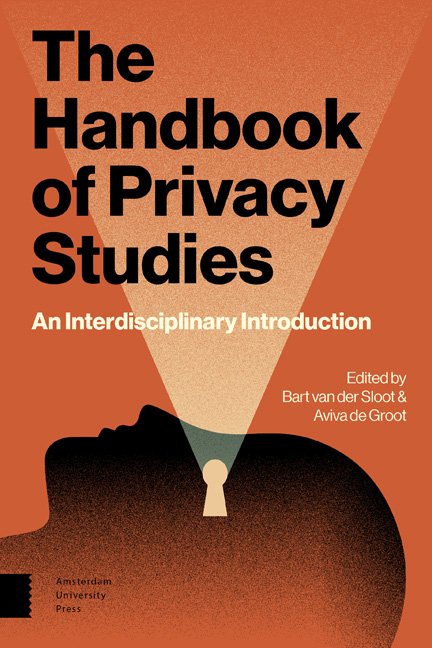Book contents
- Frontmatter
- Contents
- Introduction
- 1 Privacy from a Historical Perspective
- Legislating Privacy: Technology, Social Values, and Public Policy
- 2 Privacy from a Legal Perspective
- Three Dimensions of Privacy
- 3 Privacy from an Ethical Perspective
- Nudging: A Very Short Guide
- 4 Privacy from an Economic Perspective
- Security, Privacy, and the Internet of Things (IoT)
- 5 Privacy from an Informatics Perspective
- Political Science and Privacy
- 6 Privacy from an Intelligence Perspective
- A Privacy Doctrine for the Cyber Age
- 7 Privacy from an Archival Perspective
- Medical Privacy: Where Deontology and Consequentialism Meet
- 8 Privacy from a Medical Perspective
- Privacy Law – on the Books and on the Ground
- 9 Privacy from a Media Studies Perspective
- Diversity and Accountability in Data-Rich Markets
- 10 Privacy from a Communication Science Perspective
- Still Uneasy: a Life with Privacy
- 11 Privacy from an Anthropological Perspective
- About the Authors
10 - Privacy from a Communication Science Perspective
- Frontmatter
- Contents
- Introduction
- 1 Privacy from a Historical Perspective
- Legislating Privacy: Technology, Social Values, and Public Policy
- 2 Privacy from a Legal Perspective
- Three Dimensions of Privacy
- 3 Privacy from an Ethical Perspective
- Nudging: A Very Short Guide
- 4 Privacy from an Economic Perspective
- Security, Privacy, and the Internet of Things (IoT)
- 5 Privacy from an Informatics Perspective
- Political Science and Privacy
- 6 Privacy from an Intelligence Perspective
- A Privacy Doctrine for the Cyber Age
- 7 Privacy from an Archival Perspective
- Medical Privacy: Where Deontology and Consequentialism Meet
- 8 Privacy from a Medical Perspective
- Privacy Law – on the Books and on the Ground
- 9 Privacy from a Media Studies Perspective
- Diversity and Accountability in Data-Rich Markets
- 10 Privacy from a Communication Science Perspective
- Still Uneasy: a Life with Privacy
- 11 Privacy from an Anthropological Perspective
- About the Authors
Summary
Introduction
Privacy has emerged as a prominent topic of inquiry and has made individuals evermore mindful of its presence in everyday life. Privacy is a value in many cultures, contexts, academic disciplines, and within legal domains. Yet, privacy is often difficult to unpack. In each sphere, there are often a multiplicity of ways to think about privacy as is represented in the chapters found in this volume. This chapter discusses privacy from a communication science perspective focused on a theoretical understanding of privacy through the lens of Communication Privacy Management theory (CPM) (Petronio 1991, 2002, 2016; Petronio and Durham 2008). Communication privacy management research ascribes to using social science methodologies in juxtaposition to the historic disciplinary base of rhetoric and public speaking that reflects early developments of the communication discipline in the United States (National Communication Association 2018). Communication science typically uses both quantitative and qualitative methods rather than rhetorical or humanistic inquiry. However, the scope of communication studies in the United States sits side by side with the historic approaches focused on the power of communicating through public speaking in everyday life.
Communication between and among individuals spans many conditions and situations. Understanding the nature of human communication requires such issues as knowledge about societal issues, psychological conditions, message generation, the nature of conflict, the way groups function, organizational issues, persuasion, and communication that surrounds political issues.
The importance of having a broad-based understanding of how human communication functions allows for a deeper grasp of the complexities inherent in communication interactions. This approach provides a more complete way of understanding the nature of human communication. National and regional communication studies organizations in the United States, such as the National Communication Associations, encompass many areas of expertise and theoretical approaches. As an outcome, the discipline of communication, in which communication science resides, has many different emphases and theories. For example, foci such as planning theory (Berger 1997) that is devoted to understanding issues of goal attainment through communicative action and the theory of imagined interaction that focuses on such issues as rumination (Honeycutt 2003).
- Type
- Chapter
- Information
- The Handbook of Privacy StudiesAn Interdisciplinary Introduction, pp. 387 - 408Publisher: Amsterdam University PressPrint publication year: 2018



